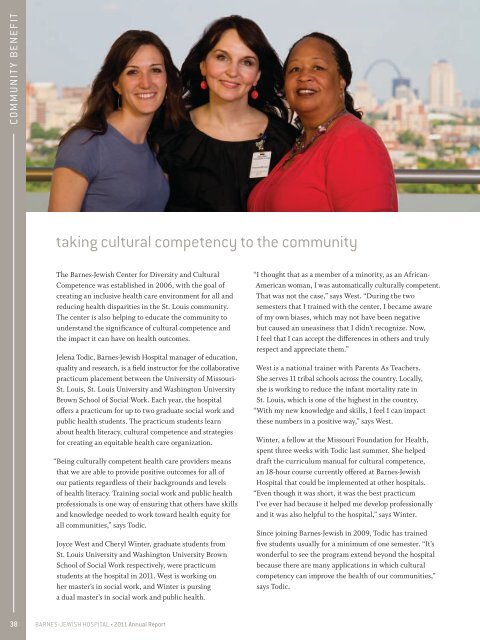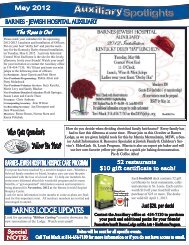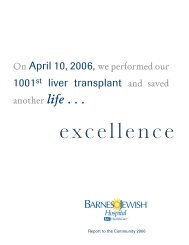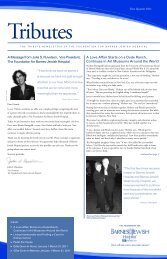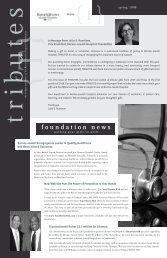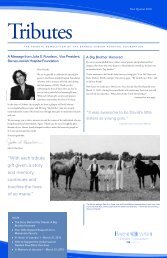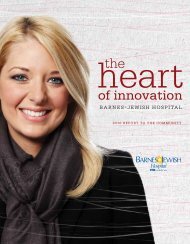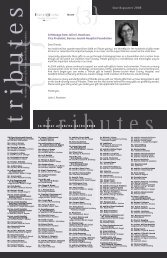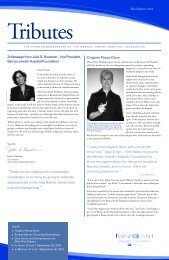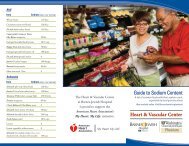D EFIN IN G M O M EN TS - Barnes-Jewish Hospital
D EFIN IN G M O M EN TS - Barnes-Jewish Hospital
D EFIN IN G M O M EN TS - Barnes-Jewish Hospital
- TAGS
- efin
- www.barnesjewish.org
You also want an ePaper? Increase the reach of your titles
YUMPU automatically turns print PDFs into web optimized ePapers that Google loves.
COMMUNIT Y B<strong>EN</strong>EFIT<br />
taking cultural competency to the community<br />
The <strong>Barnes</strong>-<strong>Jewish</strong> Center for Diversity and Cultural<br />
Competence was established in 2006, with the goal of<br />
creating an inclusive health care environment for all and<br />
reducing health disparities in the St. Louis community.<br />
The center is also helping to educate the community to<br />
understand the significance of cultural competence and<br />
the impact it can have on health outcomes.<br />
Jelena Todic, <strong>Barnes</strong>-<strong>Jewish</strong> <strong>Hospital</strong> manager of education,<br />
quality and research, is a field instructor for the collaborative<br />
practicum placement between the University of Missouri-<br />
St. Louis, St. Louis University and Washington University<br />
Brown School of Social Work. Each year, the hospital<br />
offers a practicum for up to two graduate social work and<br />
public health students. The practicum students learn<br />
about health literacy, cultural competence and strategies<br />
for creating an equitable health care organization.<br />
“Being culturally competent health care providers means<br />
that we are able to provide positive outcomes for all of<br />
our patients regardless of their backgrounds and levels<br />
of health literacy. Training social work and public health<br />
professionals is one way of ensuring that others have skills<br />
and knowledge needed to work toward health equity for<br />
all communities,” says Todic.<br />
Joyce West and Cheryl Winter, graduate students from<br />
St. Louis University and Washington University Brown<br />
School of Social Work respectively, were practicum<br />
students at the hospital in 2011. West is working on<br />
her master’s in social work, and Winter is pursing<br />
a dual master’s in social work and public health.<br />
“I thought that as a member of a minority, as an African-<br />
American woman, I was automatically culturally competent.<br />
That was not the case,” says West. “During the two<br />
semesters that I trained with the center, I became aware<br />
of my own biases, which may not have been negative<br />
but caused an uneasiness that I didn’t recognize. Now,<br />
I feel that I can accept the differences in others and truly<br />
respect and appreciate them.”<br />
West is a national trainer with Parents As Teachers.<br />
She serves 11 tribal schools across the country. Locally,<br />
she is working to reduce the infant mortality rate in<br />
St. Louis, which is one of the highest in the country.<br />
“With my new knowledge and skills, I feel I can impact<br />
these numbers in a positive way,” says West.<br />
Winter, a fellow at the Missouri Foundation for Health,<br />
spent three weeks with Todic last summer. She helped<br />
draft the curriculum manual for cultural competence,<br />
an 18-hour course currently offered at <strong>Barnes</strong>-<strong>Jewish</strong><br />
<strong>Hospital</strong> that could be implemented at other hospitals.<br />
“Even though it was short, it was the best practicum<br />
I’ve ever had because it helped me develop professionally<br />
and it was also helpful to the hospital,” says Winter.<br />
Since joining <strong>Barnes</strong>-<strong>Jewish</strong> in 2009, Todic has trained<br />
five students usually for a minimum of one semester. “It’s<br />
wonderful to see the program extend beyond the hospital<br />
because there are many applications in which cultural<br />
competency can improve the health of our communities,”<br />
says Todic.<br />
LEFT: Jelena Todic, <strong>Barnes</strong>-<strong>Jewish</strong><br />
manager of education, quality and<br />
research (center), and graduate students<br />
Cheryl Winter (left) and Joyce West.<br />
RIGHT: Jessi Meyer, rehabilitation<br />
counselor for The Rehabilitation<br />
Institute of St. Louis and Heather<br />
Heil, injury prevention coordinator<br />
for <strong>Barnes</strong>-<strong>Jewish</strong> trauma services,<br />
present the ThinkFirst program to<br />
a local high school.<br />
taking the time to<br />
make good choices<br />
Studies show that the young rather than the old tend to engage<br />
more frequently in risk-taking behavior. With age, comes a keener<br />
sense of one’s mortality. <strong>Barnes</strong>-<strong>Jewish</strong> <strong>Hospital</strong> and the national<br />
ThinkFirst program recognize this and address it with a program<br />
geared specifically to teenagers. As a Level 1 Trauma Center, with<br />
recognition by the American College of Surgeons, <strong>Barnes</strong>-<strong>Jewish</strong><br />
is dedicated to engaging in programs like ThinkFirst to create<br />
awareness of injury prevention in our community.<br />
ThinkFirst for Teens is a dramatic program that takes a more serious<br />
look at risk-taking activities through the eyes of young people who<br />
have suffered brain or spinal cord injuries. Jessi Meyer is one of these<br />
young people who suffered a life-changing accident.<br />
In 2005, Meyer and her grandmother were standing on a hill next<br />
to their van when she noticed the emergency brake on. She leaned<br />
in to disengage the brake, not knowing the van was in reverse.<br />
When the van began rolling down the hill, the door slammed into<br />
Meyer folding her in half.<br />
Meyer spent a week at <strong>Barnes</strong>-<strong>Jewish</strong> <strong>Hospital</strong>, nine weeks as an<br />
inpatient at The Rehabilitation Institute of St. Louis, followed by<br />
five months as an outpatient working on her recovery and mobility.<br />
Meyer was still in college when the accident happened. Afterward,<br />
she changed her career path to become a rehabilitation counselor.<br />
“Obviously, this was a huge life change for me and I wanted to be<br />
able to help others adjust who might be in similar situations,” says<br />
Meyer. Shortly before Meyer graduated, she was contacted by The<br />
Rehabilitation Institute, which was looking for a full-time counselor.<br />
In addition to her position as a rehabilitation counselor, Meyer is a<br />
Voice for Injury Prevention (VIP) speaker for the ThinkFirst program.<br />
She and other VIP speakers join Heather Heil, director of ThinkFirst’s<br />
St. Louis branch and the injury prevention coordinator for <strong>Barnes</strong>-<br />
<strong>Jewish</strong> trauma services, to educate teenagers about the anatomy of<br />
the brain, spinal cord and central nervous system. The VIP speakers<br />
share their personal stories, discussing how they were injured, how<br />
they could have prevented the injury and how they deal with life after<br />
paralysis or brain injury.<br />
“The goal is to create a forum for open and frank dialogue about this<br />
topic before an accident or injury happens,” says Heil. “If we can get<br />
teens to be more thoughtful about their actions, hopefully some of<br />
these injuries will be prevented.”<br />
38 BARNES-JEWISH HOSPITAL • 2011 Annual Report<br />
D<strong>EF<strong>IN</strong></strong><strong>IN</strong>G MOM<strong>EN</strong><strong>TS</strong><br />
39<br />
COM M UNIT Y B<strong>EN</strong>EFIT


